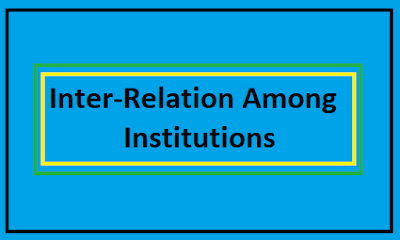An economic
organization is a structure in which the population is created and supplied
with goods and services. Ideally speaking, the production and delivery of these
products and services are driven by sound economic motives, i.e., by optimizing
efficiency and minimizing costs. This ensures that the production factors are
put to full use at a low rate. That's the depiction of an ideal economy. This
is far from accurate in real experience, however. As the economic organization
forms part of the social structure, it should be regarded as a sub-system
related to other social sub- systems, such as religious, family, educational
and political sub-systems. Therefore, for understandable reasons, the economic
sub-system is very much influenced by other sub-systems' operations.
Max Weber
concluded that a community's functional ethics arising from its religious
orientation played a very important role in promoting the acceptable work
culture among people. Different empirical results have shown conclusively that
all segments of the population do not respond in the same way and to the same
degree to economic incentives (a perfectly rational economic device). There are
many cases of which improved 'take home pay' continues to increase job
absenteeism and alcoholism rather than motivating them to perform harder and
improve. It is argued that if the members of a society who work for their own
sake have an ideological outlook, that attempts are to be made to obtain a
better standard of life, society will demand a dedicated labor force.
"This-worldly"
altitude fostered by Protestantism, according to Max Weber, contributed greatly
to the development and development of capitalism in Western Europe in the
initial stages. Some writers point out that the "other-worldly"
mindset, promoted by Hinduism, hampers the production among Hindus of an
acceptable working culture. Therefore, religious preference needs to be
regarded as one of the essential determinants of the creation and quality of
jobs. In a major way, the essence of the family organization influences the
economic sub-system. A close-knit family structure, such as a consanguineous or
common family, helps to reinforce relations of kinship. As a consequence,
according to Talcott Parsons, the merit standards or success ideals are likely
to be superseded by more prevalent values of ascription, particularism and
affectivity. The modernization of the economy, based on rationalistic
considerations, is adversely affected under these conditions. A nuclear family
pattern, on the contrary, is likely to create universal values of accomplishment
because partnerships between families appear to be largely impersonal. In such
a setting, the whole society, including the economy, is expected to experience
a larger degree of rationalization.
The political
subsystem impacts the economy in different ways. In the first place, only
political power can build and maintain an atmosphere conducive to hard and
honest labor. The Third World regimes were described by Gunnar Myrdal as
"soft" governments, which means that these governments are unable or
unable to take hard decisions that impact society as a whole and the economy in
particular. A government which has the political will to do so can counter the
vices of corruption, nepotism, dysfunctional labor relations, unhealthy and
inequitable distribution of wealth and profits, which have a very close impact
on the efficient functioning of the economy. Unfortunately, such political will
is absent in most developed societies, with the consequence that the economy is
stagnating. Secondly, the economy is often influenced by the philosophy that
informs democratic institutions. Any developed world nations, for example,
uphold the ideal of socialism as the driving philosophy for the molding of the
economic system.
The
implication is that the pitfalls of the socialist economy are ignored in terms
of reduced production and efficiency. Even as socialist policy patterns tend to
be politically inefficient, realistic considerations are superseded by moral
adherence to socialism. Therefore, the economic sub-system is very much
influenced by the existence of a society's overarching political entity. It is
not necessary to overemphasize the importance of an educational institution to
the economy, especially in the modern world. Since the eighteenth century, the
trajectory of technological development has been characterized by the use of
different forms of electricity, one after another, vis., steam power,
electrical power and electronic power.
Using
robotics in commercial manufacturing is the newest breakthrough. Obviously, the
educational sector has a very important role to play in developing professional
man-power to operate new manufacturing facilities. In addition, diverse management
techniques have been developed to achieve optimal efficiency of output factors.
In this area, prospective managers often have to be taught the requisite
skills. Society is progressing toward a modern information culture, as Daniel
Bell has argued. Awareness was, of course, important for every culture to work.
The shift in the character of information itself is what is special to today's
culture.
As compared
to scientific knowledge, there is stronger focus now-a-days on theoretical
knowledge. Continuous study on different projects and technologies in the area
of development and management must be carried out by all industrial societies.
Many that do not do so are in danger of being thrown out of the battle for
economic growth. Therefore, the school system needs to be geared to face these
difficulties. It is clear that no institution can be segregated and regarded as
an exclusive group from other institutions. That is why a 'cluster' of
institutions is referred to as the five great social institutions, which are
political, educational, economic, family and religion.
Related Article
Agents of
Socialization - Social Group Agents
Keywords: Sociology, Introduction to sociology, Book of sociology, Culture, Institutions, Organizations, Types of Sociology, What is Sociology, Society, Human Behaviors, PDF Book Sociology, Scope of Sociology, Types of Sociology, Self,

